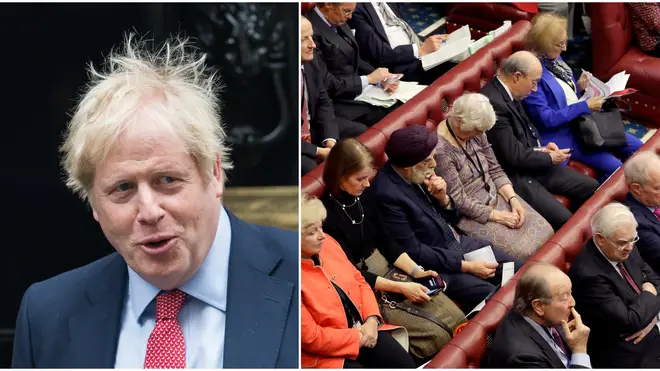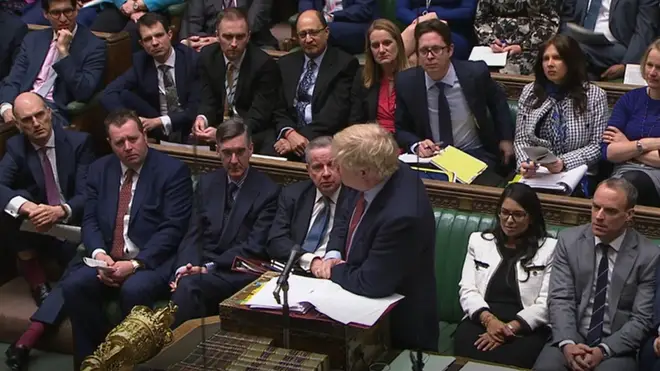
Tom Swarbrick 4pm - 7pm
22 January 2020, 17:25 | Updated: 22 January 2020, 19:10

Boris Johnson's Brexit Bill has cleared the House of Lords and is now set to officially become law.
The landmark legislation overcame its final parliamentary hurdle and will now become law upon receiving Royal Assent.
With peers accepting defeat and putting an end to the legislative tussle, it paves the way for the European Union (Withdrawal Agreement) Bill to go into the statute books.
MPs had previously rejected all proposed amendments made by the House of Lords to the Brexit deal.
The Commons overwhelmingly dismissed the five changes made by peers to the prime minister's legislation.
Speaking in the upper chamber, Brexit minister Lord Callanan said: "We are at the end of what seems like a very long road.
"The final stages of this Bill represent something which many of us thought might never happen - Parliament passing the legislation necessary to implement a Brexit deal and to finally deliver on the 2016 referendum."
He added: "I know many on the benches opposite are disappointed that the Commons has chosen to disagree with all of the amendments that peers passed this week.
"I would, however, like to reassure peers that their expertise, their contributions will continue to play a valuable role after Brexit.
"Following our exit, this House will see more legislation on a range of topics connected to the departure from the European Union. In some cases, it will be the first time in decades that the UK has legislated on some of these matters."
The Brexit deal has just cleared the House of Lords
— Andrew Adonis (@Andrew_Adonis) January 22, 2020
Given the result of the election, we could do no other. The pro-Europeans lost, Johnson won. The effect of having Corbyn leading the Labour Party & Swinson the Lib Dems, alas. A real tragedy for the country
Lord Adonis used Twitter to express his dismay at the legislation's passing, calling it "a real tragedy".
He said: "The Brexit deal has just cleared the House of Lords. Given the result of the election, we could do no other. The pro-Europeans lost, Johnson won. The effect of having Corbyn leading the Labour Party & Swinson the Lib Dems, alas.
"A real tragedy for the country."
Mr Johnson's government was previously defeated in the Lords on several key issues, including the rights of EU workers - living in the UK legally - to have physical proof of their right to remain in Britain, and the power of courts to depart from the rulings of the European Court of Justice.
Peers also supported a move to protect the rights of unaccompanied child refugees by reuniting them with their families in the UK after Britain leaves the EU, as well as an amendment reaffirming the country's support of the Sewel Convention - meaning Parliament "will not normally" legislate on devolved issues without being given consent by the devolved legislature in question.
All five proposals were comfortably reversed in the Commons, with majorities ranging from 86 to 103.
The prime minister's legislation entered the "ping-pong" phase where it moves between the two chambers for deliberation until an agreement is reached.

It looks set to be formally passed into legislation before the UK officially leaves the EU on 31 January, otherwise known as Brexit Day.
Peers will now have to choose whether to continue engaging in political ping-pong with the Commons, or concede to the elected House.
It is likely the Lords will bow to MPs, rather than being seen to be disrupting the Brexit process which has divided the country since the 2016 referendum.
Opposition peers insisted their amendments were not to prevent Brexit, but to ensure the Bill was better drafted.
On Wednesday, MPs debated the proposals in the Commons, with Brexit secretary Stephen Barclay saying the government could not accept the Lords revisions on citizens' rights because it would make the EU Settlement Scheme "null and void."

Mr Barclay said: "This amendment would mean the successful EU Settlement Scheme in its current form would need to be abandoned. This is because there would be no need to register if people could later rely on a declaration that they were already in the UK.
"This would make null and void the 2.8 million applications and the 2.5 million grants of status which have already been completed."
He also defended the government's record on child refugees, saying: "Primary legislation cannot deliver the best outcomes for these children as it cannot guarantee that we reach an agreement and that is why this is ultimately a matter which must be negotiated with the EU and the Government is committed to seeking the best possible outcome in those negotiations."
Labour MP Yvette Cooper said: "That is what makes us all suspicious, that he wants to remove it because there's some reason why he thinks it will restrict what he wants to do and therefore that he's going to, in the end, betray the commitments that have been made to the most vulnerable children of all."